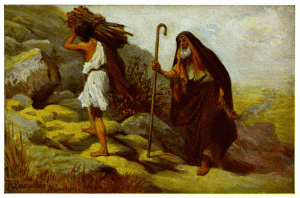WHO WAS ISAAC?—A CHARACTER SKETCH
He was successful and blessed. (Gen 26:12)
He was obedient.
- At age 37 Abraham bound Isaac to the altar (in Heb. called the akeidah, Gen 22).
- Isaac was obedient to marry Rebecca, his parents’ choice, unlike Esau. He trusted and had faith in his parents even as he had at the akeida.
He had deep and personal relationship with YHVH.
- Here we learn that obedience to and faith in and love for parents leads to devotion to YHVH. Honoring one’s parents is the key to honoring YHVH and entering into relationship with him. That is why the fifth commandment to honor one’s parents is placed after the commands to love Elohim. In Genesis 24:63 and 25:21 (see The Stone Tanach rendering of this verse in addition, The ArtScroll Beresheis, p. 1048, which says Isaac prayed abundantly and urgingly, i.e., persistent prayer, a penetrating prayer or request), we see that Isaac had a deep and personal relationship with his Creator.
He had strong faith.
- Though childless and barren, Isaac and Rebecca kept their faith in the promises of YHVH alive (Gen 25:19–26). In verse 21 we see Isaac seeking YHVH for the answers to life’s dilemmas and tough problems (he had a vibrant and abiding relationship with his Heavenly Father). The same can be said of Rebecca (v. 22).
He was a peacemaker with his neighbors to his own hurt in that he didn’t assert his personal (even legal) rights.
- Though opposed in the digging of wells, he refused to feud over his legal rights to these wells. He avoided strife and quarreling with his neighbors. After digging the third well, YHVH brought comfort to Isaac’s weary soul (Matthew Henry, p. 38).
- He was neighborly with his unsaved neighbors. Though Abimelech and his people had wronged Isaac, he did not rebuke them for stealing the first two wells. Was this a sign of Isaac’s meekness or weakness? Matthew says no (p. 38) and Arthur Pink says yes (p. 233).
What are some comparisons between the three patriarchs?
- Abraham was the man of the altar. He built altars as a form of worship to YHVH. The altar is mentioned more times in connection with Abraham than the other two patriarchs.
- Isaac was the man of the well. Wells mentioned seven times in connection with Isaac.
- Jacob was the man of the tent. The tent is mentioned more times in connection with Jacob.
What are the spiritual implications of the altar, the well and the tent?
The Abrahamic Covenant is the covenant of salvation (by grace through faith, see Rom 4). The tabernacle (or tent) in the wilderness is a picture of the steps in the salvation process. In one’s spiritual journey toward YHVH Elohim, one must first come to the altar of sacrifice (a picture of the cross), then the one must come to the bronze laver (a picture of baptism or immersion for the remission of sins, spiritual cleansing, the washing of the water by the word, and receipt of the Holy Spirit). Afterwards, one enters the tent or tabernacle to commence a deeper and more intimate relationship with YHVH. Do we not see this progression in the lives of the Patriarchs? They went from the altar to the well, and then into the tent (later the Tabernacle of Moses wherein were the 12 loaves of bread representing the 12 tribes of Israel) from which sprang the 12 sons or tribes of Jacob the tent-dweller?
This shows us how we come into a spiritual relationship with our Father in heaven: We have to start with an encounter with Yeshua at the cross. From there, we must get spiritually cleansed by the washing of the water of Elohim’s Word and be filled with and led by the Holy Spirit. From there, we enter into an intimate relationship with YHVH as we come into his home (the tabernacle is a picture the New Heavens and New Earth with the Holy of Holies picturing the New Jerusalem) and become part of 12 tribes of redeemed Israel.



Thank you for let us know we need to obey like Issac ,